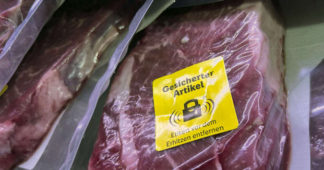How Israel Became the Global Center For Alternative Meat Tech
By Aryn Baker
Jan 9, 2024
At the annual Food Tech Israel conference held in Tel Aviv on Nov. 7, exhibitioners offered samples of hydroponically-grown vanilla, reduced-sugar sugar, protein bars with all the benefits of breast milk, and a kind of modified pond scum with the texture of caviar and a whiff of wheatgrass—the taste of a futuristic food-scape. But by far the biggest lines could be found in front of the stands offering up more traditional expo fare: lamb kebabs, pulled beef pitas and burger sliders. Those with invitations to private tastings dined on steaks, roast beef with potatoes, chicken sausages, and triangles of gooey grilled cheese sandwiches. It was enough to make even the most committed carnivore crave a salad.
But it was a scene even a vegan would enjoy. The cheese was produced from microalgae, and the roast beef—as succulent and savory as the real thing—was made from fermented plant proteins. The kebabs, burgers, and pulled beef were plant based from Redefine Meat , the chicken and steak, served offsite by SuperMeat and Aleph Farms respectively, were cultivated from biopsied stem cells in bioreactors. About the only animal-based product to be found at the venue was a lonely quart of cow’s milk tucked behind a phalanx of plant-based alternatives at the coffee stand.
The future of Israeli food technology, it would seem, does not include animals. Israel is second only to the United States in terms of start-ups and investments when it comes to alternative protein companies, receiving nearly $1 billion from investors since 2020. A country that boasts the highest per-capita consumption of poultry, the fourth-highest consumption of red meat, and yet is still home to the world’s highest percentage of vegans, Israel is well situated for incubating a new meat revolution with world-wide ambitions. Three of the first eight cultivated meat companies in the world started in Israel, and all three—Aleph Farms, Super Meat and Believer Meats, along with Nasdaq-listed newcomer Steakholder Foods—are poised for international distribution once local food regulators authorize sales of lab-grown meat.
Given its history as a politically isolated state in a water-poor region, Israel has long been forced to innovate when it comes to its food sector. Between advances in water desalination, greenhouse construction, precision irrigation, and hydroponics, the country has grown into an ag-tech powerhouse. But it is still not self-sufficient in food. Israel’s poultry and dairy industries supply more than 90% of domestic demand, yet they rely on imported grain that must come in overseas—the borders with Lebanon and Syria are closed by ongoing conflict, and trade with neighbors Jordan and Egypt is nearly non-existent due to political tensions over its illegal occupation of Palestinian territories.
Meanwhile, a growing population—both in Israel, and in the Palestinian West Bank— is driving up real-estate prices and cutting into arable land. Water shortages caused by climate change are making irrigation of new crops less predictable and more costly. “Land here is scarce, and water is expensive. This is why we must focus on innovation,” says Didier Toubia, the CEO and co-founder of Aleph Farms. According to the Good Food Institute (GFI), an international advocacy and research institution that promotes alternative protein technologies, cultivated meat—grown from stem cells in a bioreactor—reduces water use by up to 78% and cuts land requirements by up to 95%, compared to conventional beef farming.
Continue reading at time.com
We remind our readers that publication of articles on our site does not mean that we agree with what is written. Our policy is to publish anything which we consider of interest, so as to assist our readers in forming their opinions. Sometimes we even publish articles with which we totally disagree, since we believe it is important for our readers to be informed on as wide a spectrum of views as possible.











